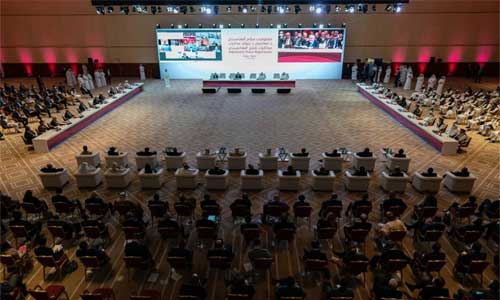At last some encouraging news is being heard from Doha, Qatar regarding intra-Afghan peace talks that have been facing stalemate for weeks now. Both the Republican team and the Taliban representatives involved in the talks confirmed on Wednesday (Dec. 2, 2020) that the procedural framework for the talks has been agreed upon.
Nader Nadery, a spokesperson for the Republican team said in a statement that the current phase of negotiation shows that ‘there is a willingness among Afghans to reach sustainable peace and both sides are committed to continuing their sincere efforts to reach a sustainable peace in Afghanistan’. Meanwhile, the Taliban spokesperson, Mohammad Naeem seconded Nadery’s statement: “The current talks between the delegations from the two sides indicate that there is a will for peace among Afghans.” The statements clearly indicate a breakthrough in the stalemate and the leaders in Afghanistan, the region and the international stakeholders have all congratulated both the teams for this ‘crucial improvement’. However, it would be safe to say that Afghanistan still has to go a long way before any considerable achievement is made regarding true peace and tranquility in the country.
It is not an overstatement that the ongoing peace process is significant for Afghanistan, but for Afghanistan to achieve something worthwhile, it is crucial that the involved authorities must realize that instead of being sincere and inclusive, the process has resulted in widening the division within the country and with some regional and international allies. If the situation remains unchecked, the division may further widen to the extent that any effort to control the situation would be futile.
Thus, as a first step, the ongoing peace process must be made as inclusive as possible and the stakeholders have to display unwavering intention of pursuing the goal of attaining peace through accepting others, as the joint communique by 66 countries and and 32 international organizations demanded in the conference on Afghanistan a week ago: “We call for an inclusive and meaningful peace process with the participation of women, youth and ethnic, religious and other minorities. We affirm that any political settlement must protect the rights of all Afghans, including women, youth and minorities. It should respect the strong desire of Afghans to achieve durable peace and prosperity, and must respond to the strong desire of Afghans to sustain and build on the economic, social, political and development gains achieved since 2001, including adherence to the rule of law, respect for Afghanistan’s international obligations, and improving inclusive and accountable governance.” Thus, there is no substitute for a comprehensive and inclusive peace process for Afghanistan; and, the current breakthrough is only a very small achievement in a long and tiring process of peace-building in the country.
For Afghanistan to move forward and be able to thrive as a nation or as a state, it is crucial that more focus is diverted towards a process of true integration. The different strata, communities, and groups within the society must form the parts of a Lego that ultimately fit into something meaningful; wherein, all the parts, whether big or small in size and number, are vital for the formation of the entire construction. Such a process is largely dependent on Afghan society’s political and socioeconomic structures. In order for a true integration to take shape, it is important that all the major social and political groups in the country must feel attached to the society and must play a role in the political and social structures placed within the society.
Looking at the present political system in the country and its capacity to pave the way for the integration of the society, it is not difficult to ascertain that some very profound systemic changes must be introduced within a limited time-frame.
One of the most fundamental changes required is a republican system within the nation that can adequately compensate various ethnic and minority groups to incorporate heterogeneous Afghan society into a single whole. Though the formula appears to be simple, the practice may not be so. The dominating groups may not want to give up their authority, while the dominated ones may not play a role in maintaining the stability of the system. Thus, the groups in authority would have to sacrifice their urge to centralize authority because various ethnic groups would not be incorporated in the society and the system if they are kept away from engaging in the country’s development and the nation’s decision making process. The process of true integration can, therefore, be completed through two important phases.
First, all the ethnic groups and stakeholders must be included in a comprehensive peace process; second, political changes should be introduced within the republican system that must delegate power to different ethnic and minority groups and provide them an opportunity to at least take part in decision-making for their own communities. otherwise, neither integration would be achieved nor the ongoing process would lead to anything tangible in the long run. While the ongoing euphoria about a breakthrough in intra-Afghan peace talks would not take long to subside without achieving any clarity about the future course of action and any indication of tranquility and stability.
Home » Opinion » Intra-Afghan Talks Will Lead Nowhere Without an Integration Process
Intra-Afghan Talks Will Lead Nowhere Without an Integration Process
| Sajjad Aasim

